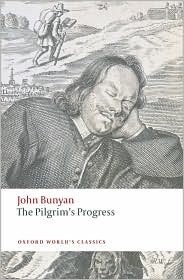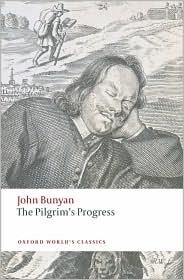
STUDY SESSION 2
Introduction (pp. 27-41)
Christian meets Goodwill and the Interpreter in this section. In addition, he will cast off his burdens. He has already been misled by Mr. Worldly-wise and will meet someone who will give him better counsel. In a sense, that is what this section is all about, namely, we should receive good instruction in our Christian walk. Bad counsel can lead to the “Slough of Despond” so we should heed godly warnings and instructions.
Readers
Goodwill (27)
Christian (27)
Interpreter (29)
Man in an Iron Cage (only 34-5)
Man rising out of Bed (35)
Simple, Sloth, & Presumption (39- very brief)
Formalist (39)
Hypocrisie (39)
Vocabulary
Dives (32) = rich man (Latin divitiae)
amity (32) = a friendly relationship (Latin amicus)
Professor (34) = one who professes to be a Christian. Puritans usually used the word negatively.
Garner (36) = granary or grain bin
Fatt (39) = this is apparently a proverb, “every tub”, ergo, “everyone must look after himself” (296)
tro (40) = trow (believe, think)
Questions (pp. 27-41)
Page #
27 What do you think the arrows represented? (cf. Eph. 6:16)[1]
28 Good Will’s words “…is the coelestial Glory of so small esteem with him, that he counteth it not worth running the hazards of a few difficulties to obtain it?” are important. Isn’t this way reasoning applicable to all who forsake the faith?
29 Note, he went through the wicket gate. Why was the burden not lifted? Good or bad? (see Observations & Notes on “Burden Loosed” or see question on p. 37 below)
30 Interpreter explains the picture. Who do you think the Interpreter represents? [see Observations & Notes]
30 Explain what Interpreter means when he says, “…is the only Man, whom the Lord of the Place…hath Authorized, to be thy Guide in all difficult places thou mayest meet with in the way…”[2]
30-1 Dust in the Parlor represents original sin. How does the “law” give strength to sin?
31-2 One room leads Christian to “two little Children” named Patience and Passion. What does “Passion” represent and is it an apt name?[3] Why do you think Passion “laughed Patience to scorn”? Why is Patience better off? (see Luke 16:19ff.)
32-3 “Fire burning against a Wall” — what role does the devil play in this picture? Who is the man behind the wall and explain the image? What is the point of the man behind the wall?[4]
33 The story of the “Palace” should be simple to understand. What does it mean?
34 “Man in an Iron Cage” How did he become a “Man of Despair”? Can this happen? Explain his answer to the question, “Is there no hope but you must be kept in this Iron Cage of Despair.”
35-6 A man rose from his bed and was frightened of what he saw. What did he see that made him afraid? Are Christians supposed to live in fear like this?
37 Christian came to the Cross and “his burden loosed from off his Shoulders.” What is the meaning of this? (see margin) What does it mean when he says that the sight of the Cross “should thus ease him of his burden”? Does this happen once, often, daily, etc. to a believer? (see Observations & Notes on “Burden Loosed”)
39 Simple, Sloth, and Presumption resist Christian’s warnings. Do you know of anyone like one of these? Explain each one.
40 Formality and Hypocrisie were convinced that the way they came in was tolerable. They argued, “[W]hat’s matter which way we get in? if we are in, we are in…” Is there another way of saying this same thing (as said in our generation)? Explain their discussion over the “Coat” (40).
Observations & Notes
Goodwill (27)
Goodwill represents the grace of God and/or the Lord Himself. On p. 27 we read: “So when Christian was stepping in, the other gave him a pull…” “The pull given by Goodwill makes it clear: it is God—not man—who opens the gate and pulls the sinner in. Just as Goodwill was the only one who could open the gate, so God alone can bring the sinner into the covenant of grace. It is true that the sinner must knock and must step in, but the faith and repentance that are required of the sinner are the gifts of God.” (Calhoun, 51)
However, Goodwill could simply be the growing conviction of the Lord’s goodness to him. A believer must be persuaded of the Lord’s goodwill towards him or he will despair. This encounter may be the growing conviction of Christian that God is merciful and gracious to the broken hearted. Nonetheless, Goodwill is most likely a reference to Christ (“I am willing with all my heart, said he” 27).
Interpreter (30)
Some “interpreters” of Bunyan’s work are divided. Some take him to be the Holy Spirit (Maureen Bradley, 21; Calhoun, 54) while other believers take him to be a faithful preacher of the Word of God (the editor of the edition of the book we’re studying takes it to be Bunyan’s faithful preacher, see p. 295). Alexander Whyte says that “every minister of the gospel is an interpreter, and every evangelical church is an interpreter’s house…” (Whyte, Bunyan Characters, First Series, 76) On the other hand, Bunyan does talk about the need for “illumination” (p. 29) as allegorized by the “Candle.” The Interpreter seems to illumine, just like the Holy Spirit. As he explains the various scenes, he gives illumination. We cannot be absolutely certain.
The Man in the Iron Cage (34-35)
This episode is considered by some to be Bunyan’s darkest picture. What exactly is the point? Most take this to be someone like Francis Spira (lived in the 1500s).[5] He was a lawyer in Italy who became one of the Protestants. However, later on he recanted and went back to the Catholic church. This apostasy is recounted in A Relation of the Fearful Estate of Francis Spira. He was remorseful but found no hope. There is another example with which Bunyan was very familiar. One of his own friend in Bedford (John Child) also died hopeless like Spira. John Child was a Baptist minister who in great fear of persecution conformed to the Church of England. John Child ended up taking his own life on Oct. 15, 1684.
Each reference to Spira is used as an example of someone who was in an irrecoverable condition. In Pilgrim’s Progress he says, “I am now a Man of Despair, and am shut up in it, as in this Iron Cage. I cannot get out; O now I cannot.” In his Grace Abounding, Bunyan himself believed that he had come to this same predicament. On reading of Spira, he feared greatly and almost despaired.
Here is the Poem that comes with the Spira story. It introduces the frightening story.
Here see a soul that’s all despair; a man
All hell; a spirit all wounds; who can
A wound spirit bear?
Reader, would’st see, what may you never feel
Despair, racks, torments, whips of burning steel!
Behold, the man’s the furnace, in whose heart
Sin hath created hell; O in each part
What flames appear:
His thoughts all stings; words, swords;
Brimstone his breath;
His eyes flames; wishes curses, life a death;
A thousand deaths live in him, he not dead;
A breathing corpse in living, scalding lead.[6]
What this man in the cage represents are those men and women who have been sealed in their unbelief. In recounting this, Christian described this man in the cage to Piety as “the Man [who] had sinned himself quite out of hopes of Gods mercy” (p. 49). Bunyan says in another place, “The day of grace ends with some men before God takes them out of this world.”[7] See Ex. 9:12, 14; Deut. 29:18-19; 1 Sam. 28:4-6; Is. 66:4; Rom. 1:28-31; 2:3-5; Eph. 4:18-19; 2 Th. 2:10-12; 1 Tim. 4:2; Heb. 6:4-6 and Jude 5, 6, 13. Thomas Scott says, “But we should leave the doom of apparent apostates to God; and improve [i.e. make use of] their example, as a warning to ourselves and others, not to venture one step in so dangerous a path.”[8]
Let us remember Esau who “found no place for repentance, though he sought it with tears” (Heb. 12:17). Though we cannot determine who has fallen into this sad condition, we should take it to heart and not provoke God by our hard-heartedness. Heed Interpreter’s warning: “Let this mans misery be remembered by thee, and be an everlasting caution to thee.” (35)
Burden Loosed (37)
Remember, he was told “As to the burden, be content to bear it, until thou comest to the place of Deliverance; for there it will fall form thy back it self.” (29) Why did he bear it up to this time? Horner’s explanation is helpful here:
Having been directed by Good-will (Jesus Christ), burdened Christian arrives at the House of Interpreter (the Holy Spirit) for edification, in parallel with John 15:26. Here this new believer portrays Bunyan who, though still burdened, was likewise edified for his journey through the profitable instruction of Pastor John Gifford. So in Grace Abounding we are told, ‘At this time, also, I sat under the ministry of holy Mr. Gifford, whose doctrine, by God’s grace, was much for my stability.’ It is significant that the first room in Interpreter’s house displays a portrait of the godly pastor, as epitomized by Gifford, thus following very closely…the sequence of events described in Grace Abounding. For Christian, the burden remains while the balm of instruction is applied; and so he continues to struggle with temptation, troubling questions and fluctuations between hope and fear; and so it was the case with Bunyan until the cross came into clear view.
…Here Christian, like Bunyan as a believer who has at last come into a state of enlightenment, stability and assurance, gains a much clearer understanding of the atonement, with all its attendant benefits, and especially that of the saving substitutionary atonement of Jesus Christ. Thus the burden of doubt falls away…Hence it would appear that Bunyan incorporates his own testimony into the narrative of The Pilgrim’s Progress as a help to those who, like himself, have needlessly floundered. …” (Horner, 137-138)
Remember, Christian passed through the Wicket Gate, the Interpreter’s House, and then the Place of Deliverance. Not all Christians experience it that way and one need not necessarily go through the same sequence. One writer says, “Bunyan symbolically intimated that in his opinion a longer or shorter period of time will elapse between coming to Christ and possessing the comfort and assurance that one’s sins are forgiven.” (Pieter de Vries cited in Horner, 140)
[1] Spurgeon says, “Bunyan alludes to the fact that, when souls are just upon the verge of salvation, they are usually assailed by the most violent temptations. …They are seeking the Saviour; they have begun to pray; they are anxious to believe on the Lord Jesus Christ; yet they are meeting with difficulties such as they never knew before, and they are almost at their wits’ end.” (Pictures from Pilgrim’s Progress, 67)
[2] Note, Christian has already met him, Evangelist.
[3] “…they must have all their good things now, they cannot stay till next Year; that is, until the next World, for their Portion of good.” (31)
[4] Note, “…that it is hard for the tempted to see how this work of Grace is maintained in the soul” (33).
[5] The dagger notation to this Oxford edition indicates this (p. 296). Bunyan refers to Spira at least five times in the course of his writings. For a superb overview of Spira and Bunyan, see Barry Horner, John Bunyan’s Pilgrim’s Progress: Themes and Issues (Auburn, MA: Evangelical Press, 2003), 223-235.
[6] Cited in Horner, Themes and Issues, 230.
[7] Bunynan, Works (Offor ed.), 3:579.
[8] Bunyan, The Pilgrim’s Progress…, with original notes by Thomas Scott (Hartford: Silas Andrus, 1830), 53.

